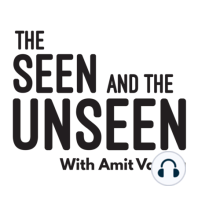12 min listen

Ep. 121: Public Choice Theory
Ep. 121: Public Choice Theory
ratings:
Length:
62 minutes
Released:
May 20, 2019
Format:
Podcast episode
Description
Governments consist of people, and people respond to incentives. For this reason, there is no better way to understand government than through the tools of economics. Episode 121 of The Seen and the Unseen is a rerun of an old episode of The Pragati Podcast, in which Amit Varma introduces Pavan Srinath to the mindblowing insights of Public Choice Theory. Also check out: What Does It Mean to Be Libertarian? -- ep 64 of The Seen and the Unseen Public Choice: A Primer -- Eomonn Butler Politics Without Romance -- Amit Varma's monthly column on Public Choice for Bloomberg Quint Parkinson's Law -- C Northcote Parkinson The Calculus of Consent -- James Buchanan and Gordon Tullock Bureaucracy and Public Economics -- William A Niskanen Urban Governance in India -- ep 31 of The Seen and the Unseen Restaurant Regulations in India -- ep 18 of The Seen and the Unseen Of Endings and Beginnings -- Amit Varma's goodbye editorial for Pragati
Released:
May 20, 2019
Format:
Podcast episode
Titles in the series (100)
Ep. 05: This is all because of Rupal Ben: A few years ago, a photo studio in Ahmedabad offered its customers free passport photographs. There was no catch, no small print. It was a free lunch. Amit Varma is joined by Mohit Satyanand, as they explore how this free lunch transformed financial... by The Seen and the Unseen - hosted by Amit Varma